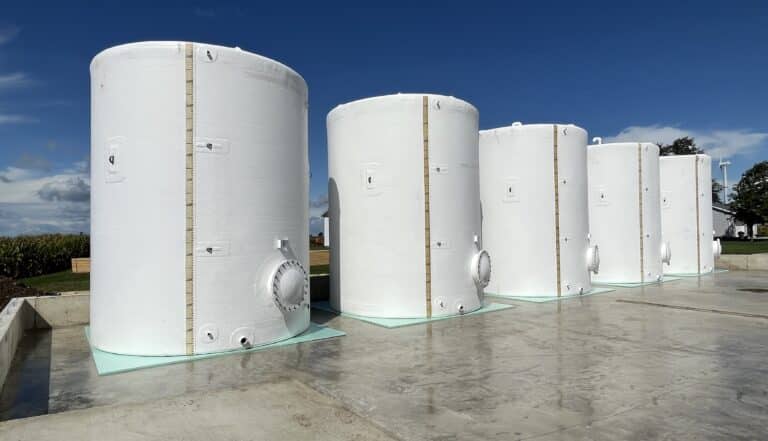How long do Fiberglass Tanks Last?

Understanding the Life of Fiberglass Tanks
KBK Fiberglass tanks will last 20-40 years. Fiberglass tanks are a popular choice in various industries due to their corrosion resistance, strength-to-weight ratio, and cost-effectiveness.
Long Lasting Fiberglass Tanks
Fiberglass, or fiberglass reinforced plastic (FRP), is a composite material made from chopped fiberglass, fiberglass strands and resin. The type of resin selected is based on the corrosiveness of the product that will be stored in the tank and the temperature of that product.
Industry uses fiberglass tanks for a variety of applications including chemical storage, water and wastewater treatment, oil, and fuel storage, and more. The longevity of these tanks is critical for minimizing operational costs and environmental risks.
KBK fabricates offers three main grades of resin for use in manufacturing fiberglass tanks:
General Purpose is the lowest level of resin used in fiberglass tanks. It offers basic properties for corrosion resistance and a lower temperature rating of 130 degrees Fahrenheit.
Isophthalic Corrosion Resin meets the sophisticated demands of modern technology in various corrosion applications. Isophthalic Polyester Resins can store products with a liquid temperature of up to 160ºF and PH level up to 10.5. Isophthalic resins are ideal for inorganic and organic acids and their solvent resistance make it acceptable for storing gasoline, kerosene, mineral spirits, and other flammable liquids.
Vinyl Ester (VE) resin offers the high performance of the standard resins. Vinyl ester is from the line of bisphenol-A epichlorohydrin epoxy-based vinyl ester products. Vinyl ester resins are the workhorses of the product line and are the most versatile. They provide excellent resistance to acid, alkalis, and oxidizing chemicals. Vinyl ester resins also have excellent high temperature capabilities and good solvent resistance. Vinyl ester resins can store products at 180ºF.
The most common method of tank fabrication is filament winding. KBK uses engineered resins to produce superior tanks.
The other required ingredient in a fiberglass tank is the fiberglass. E-glass, which is also known as electrical glass, is the standard glass composition used for most glass fibers. E-glass is made from the oxides of silicon, aluminum, calcium, magnesium, and boron.
Factors Affecting Durability
Environmental Factors
Chemical Exposure: Tanks must resist the specific chemicals they hold, and the choice of resin can affect lifespan.
Temperature Fluctuations: Extreme temperatures can degrade fiberglass materials over time.
UV Radiation: Prolonged exposure can weaken the structure unless adequately protected.
Mechanical Factors
Internal Pressures: Constant high pressures can induce stress fractures.
Physical Impacts: External forces can cause cracks and compromise tank integrity.
Design Flaws: Poor design can lead to stress points that prematurely weaken the tank.
Maintenance Practices
Regular Cleaning: Prevents chemical buildup and stresses from residues.
Inspections for Integrity: Early detection of flaws can prevent failures.
Corrective Actions: Proper repairs for detected issues are critical.
Comparative Analysis with Other Materials
Steel Tanks
Pros: High tensile strength, with similar upfront costs
Cons: Prone to corrosion, heavier, which increases installation and transportation costs.
Concrete Tanks
Pros: Extremely durable and strong, good for large volumes. Expensive
Cons: Porous nature can lead to leaks, very heavy, and less resistant to certain chemicals.
Fiberglass Tanks
Pros: Corrosion-resistant, lightweight, customizable.
Cons: Cheaper than steel and concrete, can be brittle under certain conditions.
Fiberglass tanks offer a robust solution for storing various substances, particularly where chemical resistance and weight are concerns. Fiberglass tanks outperform steel in terms of lifespan and maintenance costs, though concrete may last longer in some applications. Properly manufactured and maintained fiberglass tanks can serve effectively for 20 to 40 years, providing a reliable, cost-effective option for chemical tanks, agricultural tank, wastewater tanks, brine storage tanks and fire protection tanks.
KBK manufactures fiberglass, steel and stainless-steel tanks and distributes tanks across the US. Contact us to learn more!
